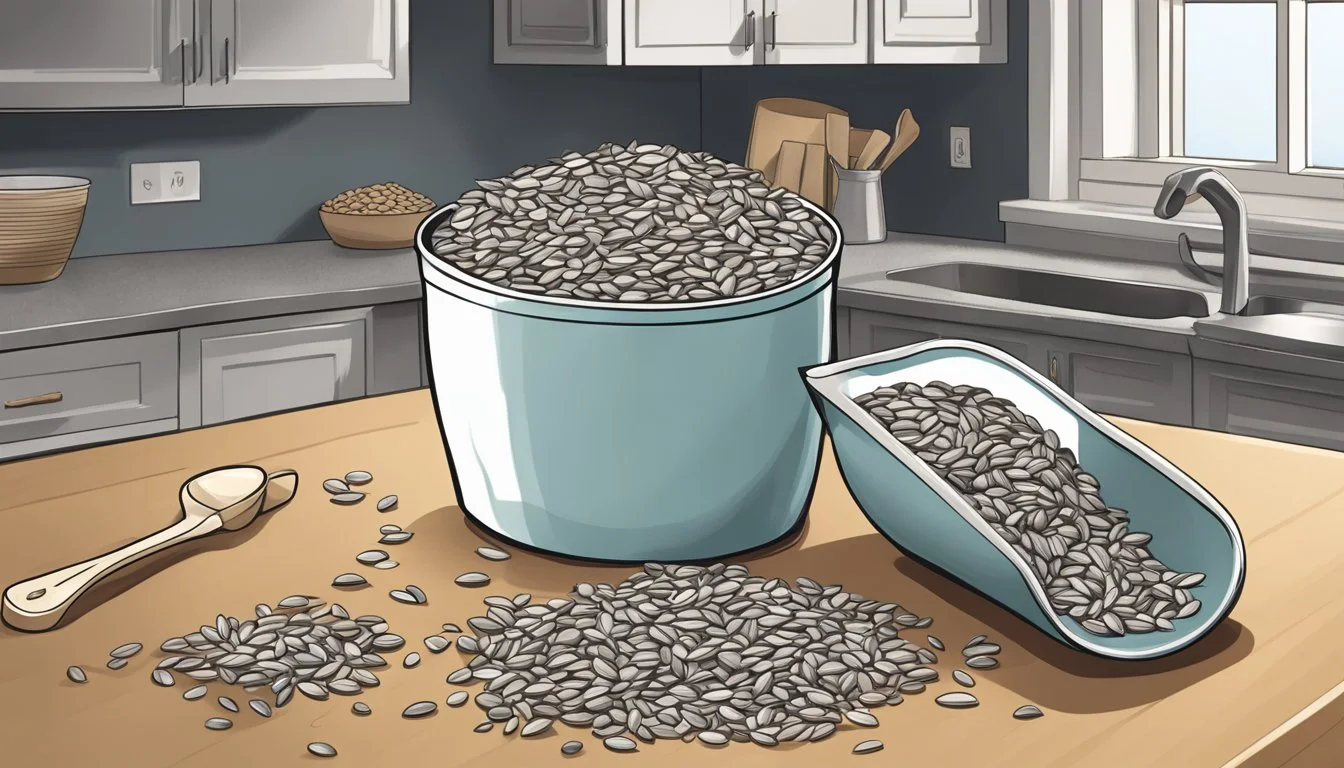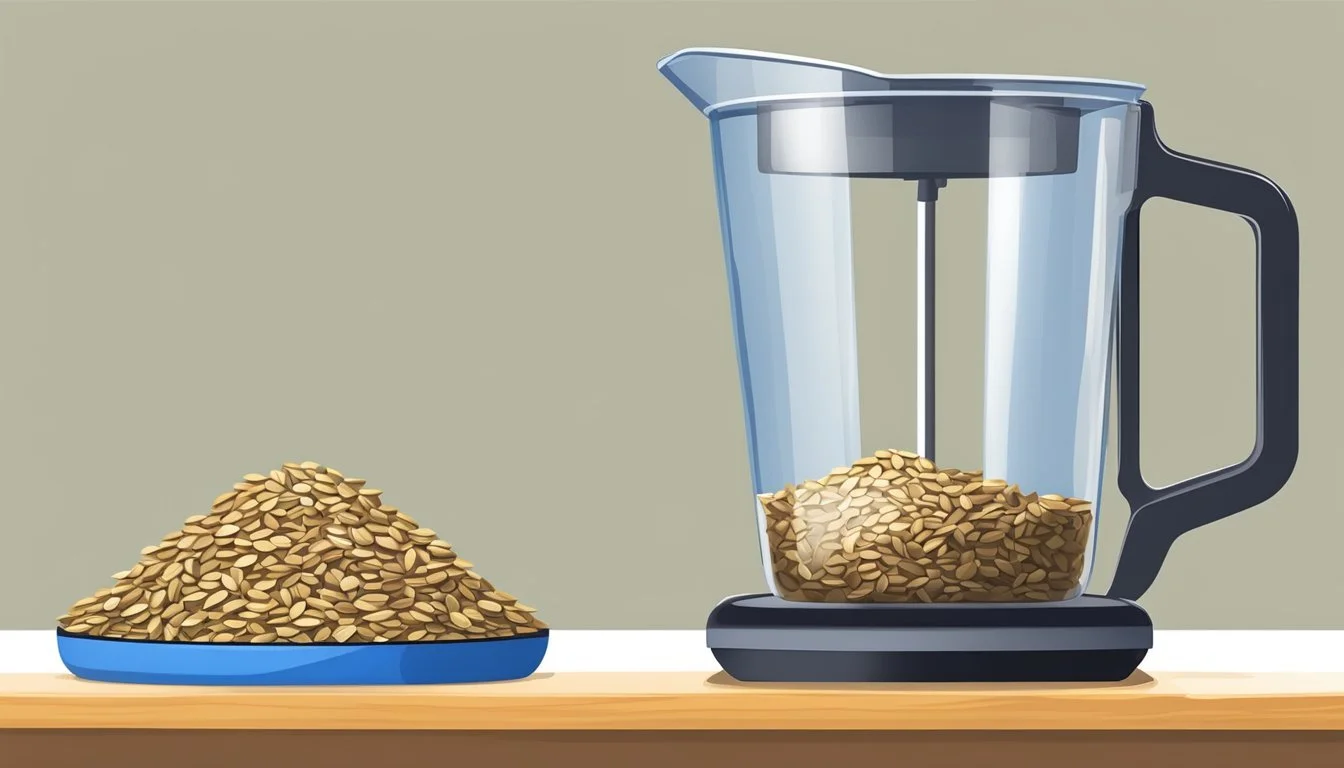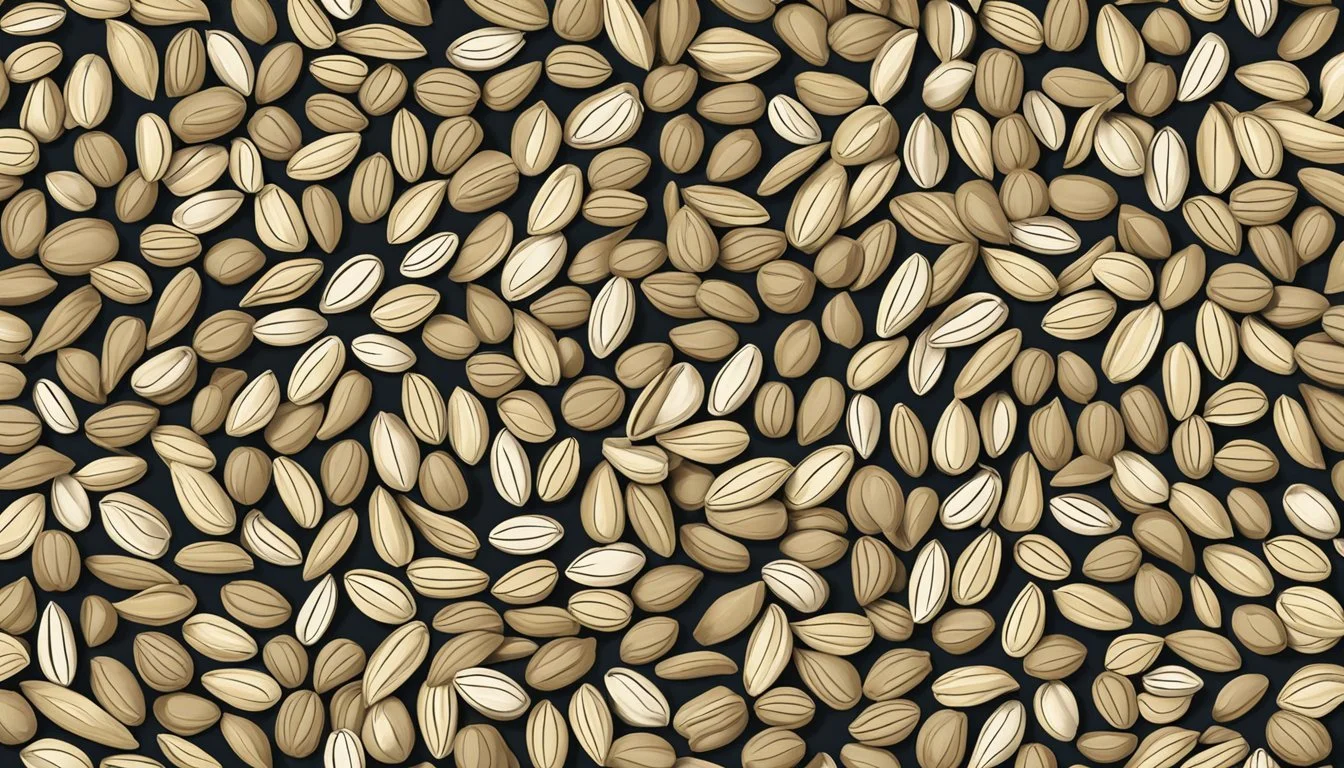How Many Cups in a Pound of Sunflower Seeds
Accurate Kitchen Conversions
When measuring sunflower seeds, whether for snacking or for inclusion in various recipes, accuracy is essential. The conversion between weight and volume is a common source of confusion. One pound of sunflower seeds roughly equates to between 2.5 and 3.5 US cups. It's worth noting that this range can vary depending on the size of the seeds and how densely they are packed.
In culinary practices, precision is key, and a common question arises about how many cups are contained in a pound of sunflower seeds. The answer simplifies the process for cooks and consumers alike. Typically, 1 pound of sunflower seeds is equivalent to approximately 3.41 US cups. This conversion ensures that recipes calling for sunflower seeds can be followed with confidence, resulting in consistently successful dishes.
Nutritional Profile of Sunflower Seeds
Sunflower seeds are nutrient-dense, providing a rich blend of proteins, carbohydrates, and beneficial fats, alongside essential vitamins and minerals. These seeds serve as a wholesome snack that can contribute positively to a balanced diet.
Protein and Carbohydrates
Protein: Sunflower seeds contain about 9.6 grams of protein per 1/4 cup serving, making them a good source of plant-based protein.
Carbohydrates: They consist of 7 grams of carbohydrates per quarter-cup serving. Of this, nearly 4 grams are dietary fiber, which helps in maintaining a healthy digestive system and contributes to satiety, while the remaining 4.5 grams are predominantly starch.
Fats and Healthy Fats
Fats: A single 1/4 cup serving of sunflower seeds provides just over 19 grams of fat. Nevertheless, most of these fats are considered healthy.
Polyunsaturated fat: Approximately 12.6 grams
Monounsaturated fat: Around 3.6 grams
These fats are essential elements in a diet as they can support heart health and provide energy.
Vitamins and Minerals
Sunflower seeds are also a powerhouse of various vitamins and minerals.
Vitamin E: Known for its antioxidant properties, they are an excellent source of Vitamin E.
Selenium: This mineral is important for thyroid function and boasts antioxidant properties.
Magnesium: They also deliver magnesium, which is vital for many body processes including nerve function and energy production.
Through their nutritional content, sunflower seeds offer antioxidants that help protect the body’s cells and promote overall health.
Understanding Weights and Measures
When converting between weight and volume measurements, such as cups and pounds, it's essential to consider the density of the substance being measured. This section will explain the different units of weight and volume and how to convert between them for a substance like sunflower seeds.
Weight Units
Weight units are used to measure the mass of an object. Common units include:
Pounds (lb): A standard unit of weight in the United States.
Ounces (oz): There are 16 ounces in a pound.
Grams (g): A metric unit of mass, where 1 pound is approximately 453.592 grams.
Kilograms (kg): One kilogram is equivalent to 1,000 grams or approximately 2.20462 pounds.
Milligrams (mg): One thousand milligrams make up one gram.
Volume Units
Volume units measure the space an object occupies. Important units comprise:
Cups: A common volume unit in cooking, particularly in the U.S. A standard US cup is 240 milliliters.
Milliliters (ml) or Centimeter³: A metric unit of volume, where one cup is equivalent to approximately 240 milliliters.
US Tablespoon (tbsp): There are 16 tablespoons in a US cup.
US Teaspoon (tsp): There are 48 teaspoons in a US cup.
Liters (L): One liter is equivalent to 1,000 milliliters or about 4.22675 US cups.
Measurement Conversion
Understanding how to convert weight to volume and vice versa involves the substance's density:
Density: Defined as mass per unit volume, it affects how weight translates to volume.
Volume to Weight Conversion: This conversion often requires a known density factor and involves multiplying volume by density to get the weight.
Weight to Volume: To find the volume from a given weight, one would divide the weight by the density.
For sunflower seeds specifically, 1 pound is equivalent to 3.41 US cups. This conversion can vary depending on factors like seed size and whether they are shelled or unshelled.
Sunflower Seeds in Recipes
In the realm of cooking, precision is key, and understanding the conversion of sunflower seed quantities from weight to volume can enhance recipe accuracy.
Ingredient Measurements
For recipes requiring sunflower seeds, measurement conversion is straightforward: 1 pound of sunflower seed kernels typically converts to 3.41 US cups. This conversion is vital for the preparation of dishes where sunflower seeds play a critical role, ensuring consistency in taste and texture.
1 lb of sunflower seeds = 3.41 US cups
0.5 lb of sunflower seeds = 1.705 US cups
0.25 lb of sunflower seeds = 0.8525 US cups
Substitutes and Equivalents
Occasionally, sunflower seeds may need to be substituted for other ingredients due to dietary preferences or availability. The food category of seeds and kernels provide options like pumpkin seeds or chopped nuts, which can serve as alternatives. When substituting, it's pertinent to consider the distinctive taste and nutritional value sunflower seeds offer, especially in recipes like trail mix or salads.
Sunflower seeds to pumpkin seeds: use a 1:1 volume ratio
Sunflower seeds to chopped nuts: use a 1:1 volume ratio, keeping in mind flavor differences
Inclusion in Dishes
Sunflower seeds, often sold dried and shelled, are incorporated into a wide array of dishes. They add a nutty flavor and a crunchy texture to salads, and they are a popular ingredient in branded foods for a healthful crunch. Sunflower seeds also excel in homemade trail mixes where their measurement by cups ensures even distribution among other ingredients.
Salads: Sprinkle measured sunflower seeds for added texture.
Trail Mix: Combine equal parts by volume of sunflower seeds with other dried ingredients.
Converting Sunflower Seeds: Pounds to Cups
When converting pounds of sunflower seeds to cups, it is essential to consider the density of the seeds and the fact that volume measurements can be affected by how the seeds are packed. The conversions provided are based on the US cup standard.
Average Conversion Rates
On average, 1 pound of sunflower seeds is equivalent to 3.41 US cups. This conversion can serve as a general guide when measuring sunflower seeds for various uses. To assist with conversions, here is a quick reference table:
Pounds of Sunflower Seeds Equivalent in US Cups 1/5 pound 0.682 US cups 1/4 pound 0.853 US cups 1/3 pound 1.137 US cups 1/2 pound 1.71 US cups 1 pound 3.41 US cups
Factors Affecting Conversion
Several factors can impact the conversion from pounds to cups, including the density of the seeds and how tightly they are packed in the cup. Sunflower seeds can vary in size, and that variance can slightly change the volume they occupy. To achieve precise measurements, especially in recipes, measuring by weight is recommended. When using volume measurements, a standard US cup should be used, and the sunflower seeds should not be compressed into the cup to avoid inaccuracies.
Health Benefits and Dietary Considerations
Sunflower seeds, obtained from the Helianthus annuus plant, are nutrient-dense and associated with several health benefits, particularly in the context of heart and digestive health. They contain healthy fats that can influence cholesterol levels and provide dietary fiber, which benefits digestion. However, individuals should be aware of potential allergies and sensitivities when including these seeds in their diet.
Heart Health
Sunflower seeds are a rich source of polyunsaturated and monounsaturated fats, which are types of healthy fats beneficial for heart health. These fats can help lower bad cholesterol levels and reduce the risk of heart disease. Specifically, sunflower seeds offer substantial amounts of vitamin E, an antioxidant associated with preventing heart disease.
Cholesterol: Consuming sunflower seeds may help lower LDL (bad) cholesterol and increase HDL (good) cholesterol levels due to their healthy fat content.
Heart Disease Prevention: The magnesium and potassium in sunflower seeds also contribute to cardiovascular health by regulating blood pressure and preventing hypertension.
Digestive Health
The fiber content in sunflower seeds is quite significant, which aids in maintaining a healthy digestive system. Dietary fiber increases the bulk of stool and reduces the chances of constipation or fecal impaction.
Fiber: A serving of sunflower seeds provides essential dietary fiber, which promotes regular bowel movements and can prevent digestive problems.
Nutrients: Beyond fiber, sunflower seeds contain other nutrients like thiamin that support metabolism and overall digestive health.
Allergies and Sensitivities
While sunflower seeds offer various health benefits, they can also be an allergen for some individuals. People who have sensitivities or allergies to nut and seed products might react to sunflower seeds.
Allergy Information: Sunflower seed allergies are less common than other nut and seed allergies but can include symptoms such as skin reactions, respiratory problems, and gastrointestinal discomfort.
Cross-Reactivity: Those with allergies to other seeds and nuts should approach sunflower seeds with caution due to possible cross-reactivity.
Common Questions about Sunflower Seeds
Navigating through the myriad of questions surrounding sunflower seeds can be daunting. This section aims to clarify frequently asked questions, dispel common myths, and provide concrete information on quantities and proper storage methods.
FAQs
How many cups are in a pound of sunflower seeds?
There are approximately 2.7 to 3.2 cups of sunflower seeds in a pound, depending on the size and hulling of the seeds.What is the nutritional content of sunflower seeds?
A quarter-cup serving of sunflower seeds without shells typically contains around 207 calories, with 14.1 grams of fat, of which 2 grams are saturated fat. They also contain about 7 grams of carbs and 4 grams of fiber. These seeds are a good source of antioxidants.
Dispelling Myths
Myth: Sunflower seeds are high in carbohydrates.
Fact: Sunflower seeds are not high in carbohydrates; they contain a moderate amount of carbs, most of which is fiber.Myth: All fats in sunflower seeds are bad for your health.
Fact: The fats in sunflower seeds are mostly polyunsaturated and monounsaturated, which are healthier fats compared to saturated fats.
Quantities and Storage
Measurements: When measuring sunflower seeds for recipes or dietary tracking, it's important to note that 1 pound equals about 2.7 to 3.2 US cups of sunflower seeds, which can vary slightly.
Storage: To maintain freshness and nutritional value, store sunflower seeds in a cool, dry place. If you have dry roasted or without salt variants, ensure they are stored in airtight containers to prevent spoilage.
Disclaimer: The information provided here is estimated and may vary slightly due to factors such as the seed size and hull content. Always refer to specific packaging details for the most accurate information.
Precision and Accuracy in Measurements
When converting pounds to cups, one must consider the variability of volume and weight due to the precision of measurement tools and the substance's consistency. Accuracy and consistency are paramount for reliable conversions.
Selecting the Right Tools
Precision in measuring sunflower seeds, or any ingredient, relies heavily on using appropriate tools. Kitchen scales offer greater accuracy than measuring cups because they account for variance in the density of the substance.
Scales: Digital scales that measure in small increments (to the nearest gram or ounce) ensure accuracy.
Measuring Cups: While less accurate, they can be used with a standard conversion, understanding that there is a margin of error.
Disclaimer: Using volume measurements (cups) for weight (pounds) can lead to discrepancies, so it is recommended to measure by weight for precision.
Maintaining Consistency
Consistency in measurement techniques is vital:
Always level the measuring cups with a straight edge to avoid excess.
Use the same cups or spoons for consistency if a scale is unavailable.
Avoid packing down the substance unless the recipe specifies it.
Beyond cups and spoons, understanding the conversions to other units of measurement like gallons or liters helps when a recipe calls for larger or smaller quantities than just pounds and cups. Regardless of the units used, maintaining consistency in measurement practices is critical for achieving the intended result of a recipe or conversion task.






